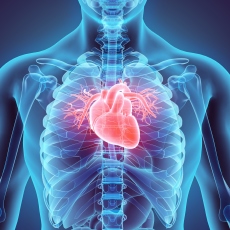How Heart Valve Disease Is Diagnosed and Treated

October 22, 2020
While it’s true that some people can lead long and healthy lives with minor heart valve issues – once it progresses to a point that it affects your ability to function, it needs to be addressed.
A heart valve replacement might seem like a scary thing, but treatments have advanced in a way that allows for many patients to undergo minimally invasive procedures to repair or replace their troublesome valves.
We talked with Mark Anderson, M.D., a leading expert in minimally invasive and robotic heart surgery and the chief of cardiac surgery at Hackensack University Medical Center about how heart valve disease is diagnosed and treated.
Symptoms of Heart Valve Disease
Heart valve disease can sometimes be easy to overlook, especially among adults who are starting to feel signs of aging.
“Chalking it up to getting old is no excuse,” says Dr. Anderson. Symptoms to look for include:
- General fatigue or getting tired easily
- Difficulty exerting energy
- Shortness of breath
- Sounds of murmur (as detected by your health care provider)
“If you have any of these symptoms, it’s certainly worth a talk with your cardiologist,” says Dr. Anderson.
Seeing a Cardiologist
Your cardiologist will be able to help determine the need for intervention. Typically, your doctor will review your symptoms and perform an ultrasound that produces images of your heart, called an echocardiogram, along with any bloodwork and stress tests that may be necessary.
Be sure to talk to your cardiologist about:
- Symptoms that you may be experiencing
- Family history
- Current medications and supplements
- Dietary and exercise habits
- Data that you may have obtained at home like heart rate, blood pressure and blood oxygen levels
Your doctor may suggest monitoring your condition and set a schedule of regular follow-up visits and tests. However, some patients may benefit from having an intervention to help prevent future complications.
Building Your Heart Team
If your doctor says your heart needs an intervention – there are a number of treatments that may be available to you. The best way to learn about all your options is to seek out a multi-disciplinary clinic that can have experts from several fields look at your case collaboratively.
At Hackensack Meridian Health, a multi-disciplinary heart team may include:
- Heart surgeons
- Interventional cardiologists
- Echocardiographers or cardiac imaging specialists
- Clinical cardiologists
- Heart failure nurse specialists
- Nutrition and exercise therapists
“A multi-disciplinary approach is really the best way to get the most comprehensive plan that’s custom tailored to you,” says Dr. Anderson. “Younger patients and those with congenital defects may especially benefit from this diverse approach.”
Treating Heart Valve Disease
Surgical treatments for heart valve disease usually involve repairing or replacing a valve. These procedures have become less invasive as new technology and techniques develop. For some patients, heart valves can even be replaced though a catheter in their leg, and many times they can go home after a short stay.
Be sure to ask your doctor if a heart valve repair is possible. Your specific case will determine if doctors can attempt to repair a valve or will need to replace it entirely. Your treatment plan should include:
- How you and your care team will protect your heart from future damage
- Evaluation of your medications and adjustments as needed
- Plans to fix the valve problem (repair or replace)
- Steps for follow-up and lifestyle changes
Next Steps & Resources:
- Meet our clinical contributor: Mark Anderson, M.D.
- To make an appointment with Dr. Anderson or a doctor near you, call 800-822-8905.
- Should You Get a Cardiac Calcium Scan?
- Blood Oxygen Levels: What’s All the Hype About?
- How Does COVID-19 Affect the Heart?
- What Causes a Heart Attack at a Young Age?
The material provided through HealthU is intended to be used as general information only and should not replace the advice of your physician. Always consult your physician for individual care.
What Causes a Heart Attack at a Young Age?

When Przemyslaw Blazejowicz suffered a heart attack, doctors at JFK University Medical Center were puzzled.
RECIPE: Heart Healthy Hummus

Here’s a quick recipe that you can use as a base to create all sorts of tasty treats that are good for your heart.